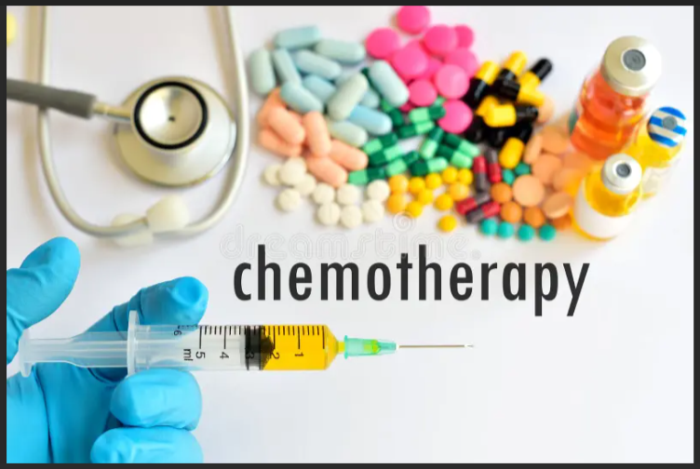What is Chemotherapy?
Chemotherapy is a type of cancer treatment that uses drugs to destroy cancer cells. It works by stopping or slowing the growth of cancer cells, which grow and divide quickly. Chemotherapy can also harm healthy cells that divide quickly, which can cause side effects.
Medical disclaimer: This content is for general awareness and does not replace a doctor’s consultation. For diagnosis or treatment decisions, consult a qualified specialist.

How Chemotherapy Works Against Cancer
Chemotherapy targets rapidly dividing cells, a hallmark of cancer cells. The drugs can interfere with various stages of the cell cycle, preventing cancer cells from growing, dividing, and spreading. By disrupting their ability to proliferate, chemotherapy helps to shrink tumors, slow disease progression, and, in some cases, eliminate cancer entirely.
Which Types of Cancer Does Chemotherapy Treat?
Chemotherapy is used to treat a wide range of cancers, including but not limited to:
- Breast cancer
- Prostate Cancer
- Oral Cancer
- Lung cancer
- Colorectal cancer
- Leukemia
- Lymphoma
- Ovarian cancer
- Pancreatic cancer
How Chemotherapy is Used with Other Cancer Treatments
Chemotherapy can be used alone or in conjunction with other cancer treatments:
- Surgery: To shrink tumors before surgery (neoadjuvant chemotherapy) or to kill remaining cancer cells after surgery (adjuvant chemotherapy).
- Radiation Therapy: To enhance the effectiveness of radiation in shrinking tumors.
- Targeted Therapy: To attack specific cancer cell markers and pathways.
- Immunotherapy: To boost the immune system's ability to fight cancer.
Chemotherapy Can Cause Side Effects
Because chemotherapy also affects healthy, rapidly dividing cells, it can cause various side effects, such as:
- Fatigue
- Nausea and vomiting
- Hair loss
- Anemia
- Increased risk of infection
- Mouth sores
- Diarrhea or constipation
- Changes in appetite
How Much Chemotherapy Costs
The cost of chemotherapy can vary widely based on factors such as:
- Type and number of chemotherapy drugs used
- Duration and frequency of treatment
- Location of treatment (hospital, clinic, or home)
- Insurance coverage
In India, the cost can range from ₹20,000 to ₹2,00,000 per cycle, depending on the above factors. Financial assistance programs and insurance plans may help offset some of these costs.
What to Expect When Receiving Chemotherapy
When receiving chemotherapy, patients can expect:
- Pre-Treatment Evaluation: Blood tests and physical examinations to determine readiness for chemotherapy.
- Infusion Process: Chemotherapy can be administered intravenously, orally, or through injections. Sessions can last from a few minutes to several hours.
- Monitoring: Regular monitoring of blood counts and organ functions to manage side effects and adjust dosages.
- Post-Treatment Care: Instructions on managing side effects and follow-up appointments for further evaluation.
Special Diet Needs While on Chemotherapy
Maintaining a balanced diet is crucial during chemotherapy. Some dietary recommendations include:
- Eating small, frequent meals to manage nausea.
- Staying hydrated with plenty of fluids.
- Consuming protein-rich foods to maintain strength and energy.
- Avoiding raw or undercooked foods to reduce infection risk.
- Consulting with a dietitian for personalized nutritional advice.
Working During Chemotherapy
Many people continue to work during chemotherapy, but it requires careful planning and communication with employers. Some considerations include:
- Discussing flexible work hours or remote work options.
- Taking time off for treatment and recovery as needed.
- Managing fatigue and side effects to maintain productivity.
- Seeking support from coworkers and supervisors.
Each patient's experience with chemotherapy is unique, and it's essential to work closely with healthcare providers to tailor the treatment plan to individual needs and circumstances.
Discover the Best Oncologists and Cancer Hospitals in India
When it comes to cancer treatment, finding the right specialist and hospital can make a significant difference in the outcome. In this blog, we have compiled a list of the top oncologists and cancer hospitals across major cities in India, ensuring that you have access to the best care available.
Top Oncologists in Major Cities
For those seeking expert oncologists, we have identified the best specialists in key cities:
Leading Cancer Hospitals
In addition to finding the right specialist, choosing the right hospital is crucial for comprehensive cancer care. Here are the top hospitals in major cities:
Get more indepth information on Cancer treatments and their costs
Conclusion
Finding the right oncologist and hospital is the first step in your cancer treatment journey. Explore the links above to learn more about the top specialists and hospitals in your area.